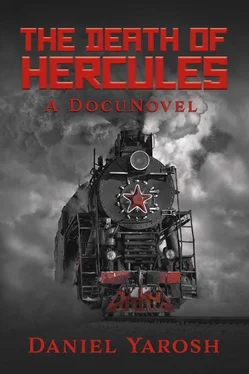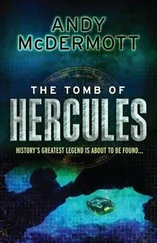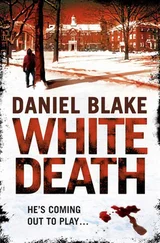“Who were they driving today?”
“I don’t know.”
“Well, we will have to make inquiries, won’t we. Discretely.” the Inspector said. He smacked his lips as if he had tasted a bitter fruit. Nothing good could come of these questions, they both knew. The Inspector made arrangements for the bodies to be taken to the morgue – no autopsy was necessary. He then directed Zalmund to drive the black sedan parked at the corner back to the Cheka motor pool. Zalmund draped a blanket from the trunk over the caked blood and slid into the seat where his friend had sat only a few hours before.
But he didn’t go to the motor pool. He knew Tad and Miro as the two most apolitical fellow-travelers in the service. What could they possibly have done to warrant summary execution? There was only one answer and he had to know immediately. Zalmund raced the sedan through the streets back to his home street. He slammed on the brakes and bounded out of the car, climbing the stairs two at a time to enter his apartment. Not much was amiss. But in the air hung the smoky smell of gunfire. The silence was sickening. He turned to where a mattress was tucked into the corner of the main room. It was torn with a dozen bullet holes, and Lenish and Petra lay tangled in the sheets. They didn’t move. They were dead.
Zalmund quickly closed the front door and sat down. These were executions by the State, that was clear. But not political, since they were not arrested and imprisoned. This was by men who knew the streets, the criminals, and had the methods of the Cheka. The chief of that group was Nicholai Popov, the former commander of the Pokrovskii barracks. What all the victims had in common was that they were all part of the task force that executed Commander Popov’s son on the night of the LSR revolt. Now the only one left was Zalmund.
Zalmund leapt to his feet and ran to the door. He opened it a crack and looked outside. Then he dashed down the stairs, into the black sedan, and drove directly to the Cheka headquarters.
He walked down his normal hallway at headquarters, head down, as inconspicuously as possible. He noticed the cracks in the marble molding, the dirt in the grout of the tile floor, the sound of his own steps echoing about him. Everyone must notice him, still alive, he thought. People passed him with not even a greeting, but with that self-importance of most petty bureaucrats, for which he was relieved. Zalmund gently turned the knob of the motor pool office room door with the slatted glass window, opened the door but a small sliver, and slipped into the room.
He walked quickly by the cubby desks toward the requisition desk. Not quick enough. Someone called his name, “Hofitz! You there!”
Zalmund turned and saw a young man he had never seen before waiving an assignment slip in the air. “You took my slip, this morning,” he said in an annoyed tone. “This one’s for you.” He waived the paper in Zalmund’s face.
“So, you couldn’t take it,”
“This one’s for you,” he insisted.
“You could do it,” Zalmund tested his determination.
“You took mine, and this one they asked for you.”
“Who?”
“I don’t know.”
Zalmund paused and looked around the room. Most were working diligently, but it seemed to him that they had all been staring at him just a moment before. Zalmund snatched the slip from his hand. “I’ll be there.”
“They’re waiting.”
“I know, I know.” Zalmund made a fuss about tucking his shirt into his trousers, pulling on his shirt sleeves to straighten his collar. He leaned his right hand on the assignment desk while he loosened the laces on his right shoe with his left hand. As he straightened up, he snatched a stack of Cheka pass forms that had been left on the desk and slipped them in his right coat pocket. With his left hand he brought up the assignment slip and made a show of reading it. “I’m going, I’m going,” he said to the young man, and headed out the office door.
But he didn’t turn left to pick up the official he was meant to drive. That turn was death. He turned right and walked swiftly to the black sedan he had left parked near the front entrance to headquarters. He gunned the engine and sped off, checking the rear-view mirror for signs that someone had noticed and might be following. But there were none.
He drove directly to the Women’s Welfare Office. He parked and sprinted up the steps of the aging brownstone. Without knocking, he opened the main office door off the shared hallway and stepped inside, closing the door behind. He was breathing hard, and beads of sweat dotted his hairline. The women closest to the door looked up from their work and stared at him. The silence spread through the office, until Deena stopped her review of accounts, and looked up at him.
Their eyes met for a moment in recognition. The next instant the bubbles they carried all burst. She saw the fear in his eyes, and her heart sank. Her eyes widened and she felt unconnected to the ground.
“Deena. Come,” he said, forcing calm into his voice.
“Now?” she said. But she knew the answer. She needed him to say that it was over.
“Yes. Now.”
Deena put down her papers and walked slowly to the front of the room. All eyes were on her, but no one moved. Zalmund held out her hand, she took it as they turned to the door.
“Deena?” they heard from the back of the room. It was a helpless sound from Alexandra Kollontai. “Good luck.” No explanation was sought or required.
They drove to the south and then the west and left the city behind in two hours. Along the road they were able to use the appearance of the black sedan and his official pass card of the day to requisition gasoline, bread and tea. At night they slept in the car, with the windows rolled down and the cool Ukraine breeze blowing through the late summer sky.
Deena and Zalmund arrived in Kyiv, a magical city on the Dnieper River, in early September 1918. The central city had a long history of cosmopolitan sophistication, and culturally dominated Moscow for most of the millennium. The Bolsheviks had failed to significantly infiltrate its politics or extend the Red Army to its city gates. So, although it was technically a Russian city, it was under the control of Imperialists officials and organized criminals who exiled themselves to the city in opposition to the Bolsheviks. On January 22, 1918, the Rada, the parliamentary ruling body, declared the independence of The Western Ukrainian Republic, with a capital in Lwów west of Kyiv. Local chieftains set up city-states in Kharkiv, Poltava and Chernobyl, just north of Kyiv. Vladimir Dragomirov was in charge of Kyiv as head of the White Russians there, and served on General Anton Denikin’s military council for the Armed Forces of South Russia. They in turn had sought and received protection from the nearby German military authorities, who were technically at peace with Russia, but who were positioning themselves to seize this prize at what they saw was the inevitable resumption of hostilities. The irony of bitter enemies living in a Bolshevik-inspired peace was lost on no one.
As an outlaw city in an outlaw state, Kyiv was a feast in the middle of a famine. Onion-topped Orthodox churches overlooked the broad blue expanse of the slow-moving Dnieper river. Cafes hosted outdoor seating under the arborio of the central Moskavya avenue. At night, the gaudy nightclubs along Klovs’kyi Uzviz sported rag-time jazz in the front room and high-stakes gambling in the back. Red-lipsticked working girls crowded the corners of Khreschatyk street in the old Lypky district, brazenly approaching the men who strolled in alone from the Mariins’kyi Park, looking for attention.
Zalmund and Deena cruised the street next to the park, drawing interested stares to the oversized Cheka sedan. Finally, Zalmund stopped at a corner, got out and leaned against the front fender with his legs crossed over the curb. He was a bit disheveled, with a two-day growth of beard, a collarless white shirt opened a few buttons at the neck, and wrinkled flannel trousers over his now shoddy boots. Deena sat demurely in the front seat, nervously twisting the handle of her handbag. A few men stopped by, some in soiled working clothes of baggy shirt and woolen britches. Zalmund spoke Polish with them. After a final group left, Zalmund got back in the car.
Читать дальше












